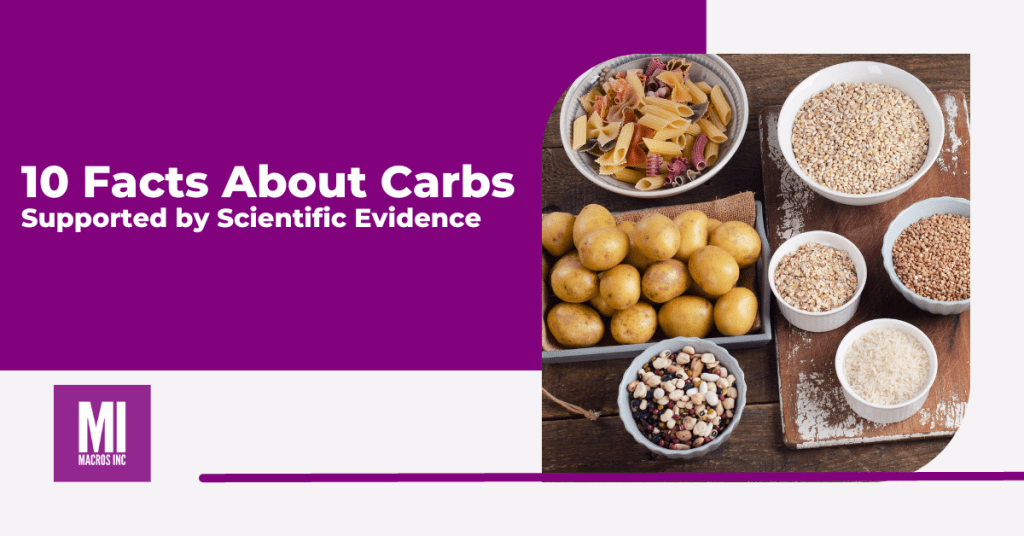Carbohydrates, or carbs, have long been a topic of debate and discussion in the world of nutrition and health. From low-carb diets to carb-loading for athletes, there’s a wealth of information out there. However, not all of it is backed by solid scientific evidence. In this article, we’ll delve into 10 things you should know about carbohydrates, all of which are supported by rigorous research.
Jump to a Topic
1) Carbs and Body Fat: A Clearer Picture
There’s a common misconception that carbohydrates are the primary culprits when it comes to weight gain and body fat accumulation. However, the reality is quite different. Scientific studies have shown that overeating carbohydrates doesn’t lead to the same degree of fat storage as overeating fats does.
In fact, if you were to overindulge in carbohydrates and fats, fats would be stored in greater quantities. This distinction is significant and defies the conventional wisdom that paints carbs as the enemy.
2) Fructose in Perspective
Fructose, often vilified for its potential negative effects on health, isn’t necessarily the dietary villain it’s made out to be. Particularly when fructose is consumed through whole fruits, its impact is much less concerning.
Research suggests that consuming up to 100 grams of fructose a day, which is a substantial amount, seems to be safe for the majority of individuals. This is great news for fruit lovers who can continue to enjoy nature’s sweet offerings without undue worry.
3) Carbs and Diabetes: Dispelling the Myth
The link between carbohydrates and diabetes is a complex and often misunderstood one. It’s crucial to note that carbohydrates themselves do not cause diabetes.
This chronic metabolic disorder stems from insulin resistance, which is a result of disrupted metabolism due to an overload of energy. The primary driving force behind diabetes is not dietary carbohydrates, but rather the overall metabolic state.
4) The Energy Source for Exercise
For those engaged in exercise, understanding the role of carbohydrates in energy production is crucial.
Studies consistently demonstrate that during physical activity performed at intensities exceeding 65% of maximum aerobic effort, a substantial portion of the energy is derived from carbohydrates.
This highlights the importance of carbs in supporting performance during moderate to high-intensity workouts.
5) Fiber: The Carbohydrate Hero
Fiber is often overlooked within the carbohydrate spectrum, but it plays a vital role in maintaining gut health and overall well-being. General recommendations suggest consuming around 12-15 grams of fiber per 1000 calories. However, these guidelines can vary significantly based on an individual’s gastrointestinal health and unique needs.
6) The Quirkiness of Glycemic Index (GI)
The Glycemic Index (GI), a measure of how rapidly carbohydrates affect blood sugar levels, isn’t a one-size-fits-all metric. Research shows that even when two people consume the same carbohydrates, their glucose responses can vastly differ. This quirkiness highlights the intricate and varied ways our bodies process carbs.
7) Satiety Surprise: Carbs vs. Fats
If you’re aiming to feel full and satisfied after a meal, carbohydrates might be your better bet. Contrary to popular belief, carbohydrates are generally more satiating per gram compared to fats. This dispels the notion that a high-fat diet is a foolproof strategy for curbing appetite in the long run.
8) Personalized Approaches to Carbs for Weight Loss
The question of whether to go low-carb or high-carb for weight loss has baffled many. However, scientific evidence suggests that there’s no universal answer.
Individuals can choose the approach that suits their preferences and metabolic response. Athletes with high training volumes, though, tend to benefit from a higher carbohydrate intake to support their energy needs.
9) Carb Restriction and Muscle Glycogen
While low-carb diets have gained popularity, prolonged carbohydrate restriction—lasting more than 2-3 weeks—can have unintended consequences. Muscle glycogen levels, a crucial source of energy for physical activities, can significantly decrease. This depletion can result in impaired work capacity and reduced performance during workouts.
10) Sour Patch
While the previous points are rooted in research, one thing that’s universally agreed upon is that sour patch candies might just be the best form of carbohydrates on the planet.
Summary
The world of carbohydrates is far more nuanced than the oversimplified narratives that often dominate discussions. Armed with scientific evidence, we can dispel myths, appreciate the multifaceted nature of carbs, and make informed choices that align with our individual health and fitness goals.
So, whether you’re a fitness enthusiast, a health-conscious individual, or simply someone who loves a good candy debate, these evidence-backed insights can guide you on your journey to understanding and embracing the role of carbohydrates in your diet.
Try our nutrition coaching, for free!
Be the next success story. Over 30,000 have trusted Macros Inc to transform their health.
Simply fill out the form below to start your 14-day risk-free journey. Let's achieve your goals together!



